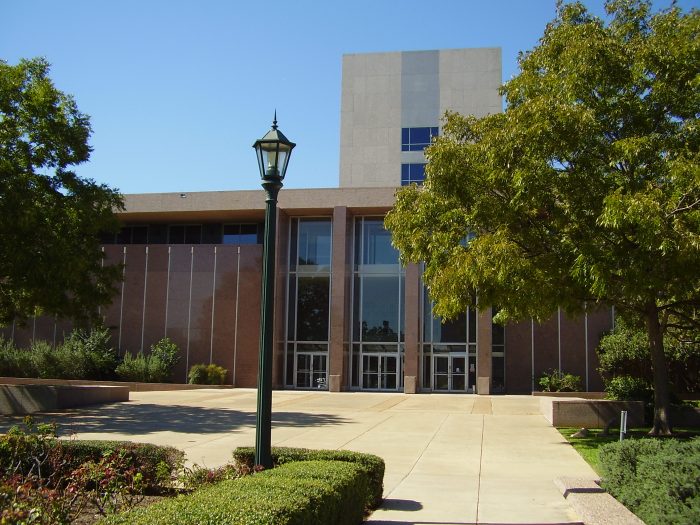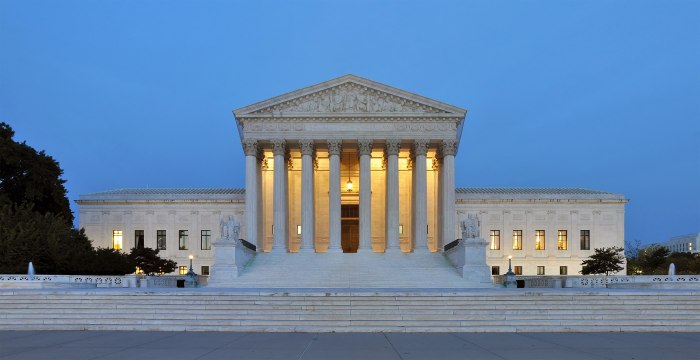BY ARTHUR S. LEONARD | In what Lambda Legal called a “stunning reversal,” an en banc majority of the US 5th Circuit Court of Appeals overruled a 2010 decision by a three-judge panel and dismissed a lawsuit brought by a gay couple seeking a proper birth certificate for the Louisiana-born child they jointly adopted in New York.
The panel representing the full circuit –– whose review had been sought by Louisiana’s attorney general, Republican James D. “Buddy” Caldwell, after last year’s three-judge ruling –– found that state officials had not violated the US Constitution’s Full Faith and Credit Clause by refusing to give full effect to a New York adoption decree and issue a new birth certificate listing both adoptive parents.
In an opinion by Chief Judge Edith H. Jones, the en banc majority held that the lower federal courts lack jurisdiction to determine full faith and credit claims made against state officials.
5th Circuit says Louisiana can refuse to list both gay parents with valid New York State decree
Specifically, the circuit ruled that the statute giving federal district courts jurisdiction over civil rights claims against states does not apply to this case. According to Jones, someone denied proper recognition of their out-of-state judgment by a state official must sue in that state’s courts; if their claim is rejected, plaintiffs can then appeal to the US Supreme Court.
Eleven of the 16 judges sitting in en banc review agreed on that point; ten held that even on the merits, the refusal to issue the birth certificate did not violate the constitutional requirement of full faith and credit. Arguably, that second finding was irrelevant to the ruling –– something termed dicta in legal parlance. It is also clearly wrong, as the dissent demonstrates.
The District Court had not taken up the couple’s equal protection claim, but that did not keep members of the majority from deciding that question as well, finding that Louisiana's refusal to issue the birth certificate did not violate the federal Equal Protection Clause.
The other two members of the majority, concurring separately, agreed with the five dissenting judges that the court should not have addressed a question not taken up by the lower court.
Judge Jacques L. Wiener, Jr., in a lengthy dissent, forcefully argued that the majority egregiously misconstrued the Full Faith and Credit Clause. The majority, he writes, also mischaracterized the plaintiffs' equal protection claim, which they had improperly taken up in the first place.
In other words, the dissenters gave the majority an “F” for their opinion, an assessment this reporter shares.
The case involves Mickey Smith and Oren Adar, a gay couple who adopted a five-year-old Louisiana-born boy in New York. Despite being presented with a certified copy of the New York court's adoption decree, the Louisiana registrar of birth certificates, Darlene Smith, refused to issue the new certificate. Following instructions from the state attorney general, she argued Louisiana does not allow adoptions by unmarried couples and should not be required to do anything that could be construed as allowing a same-sex couple to adopt –– or have any kind of legal status at all.
Represented by Lambda Legal, Adar and Smith filed suit in federal district court in Louisiana, claiming Smith’s refusal violated their rights under the Full Faith and Credit Clause to have their valid New York adoption decree recognized in Louisiana.
They also argued that the refusal violates their rights and their son's rights under the Equal Protection Clause of the 14th Amendment, by discriminating without any legitimate justification on the basis of their sexual orientation and marital status and improperly burdening the rights of their son.
Smith offered to issue a certificate listing only one of the men as a parent, but the couple declined this offer.
The trial judge granted summary judgment to the plaintiffs on their full faith claim –– finding it unnecessary to address the equal protection argument, since the underlying issue was resolved –– and ordered the state to issue the birth certificate. Louisiana appealed to the 5th Circuit.
Last year’s three-judge panel concluded the trial court needn’t even have decided the full faith and credit claim since Louisiana law, correctly construed, clearly requires the registrar to issue the new birth certificate as a ministerial function.
At that point, the state sought the en banc review, which was granted.
The en banc majority takes the curious position that the Full Faith and Credit Clause only applies to state courts, and not to state executive branch officials, a position, the dissent points out, that flies in the face of the Constitution’s clear language. The majority relied on a federal statute that expressly requires state courts to give full faith and credit to the acts, records and judicial proceedings of other states, and also on two aspects of Supreme Court precedent that the dissent charged were “cherry-picked” –– that most full faith and credit claims involve questions of whether state courts must give effect to judgments from other states and that the nation’s high court has ruled that federal courts don’t have jurisdiction to hear such claims in lawsuits between private parties.
In fact, the dissent argues persuasively, the Supreme Court has never directly ruled on the question of whether an individual can sue state officials on full faith and credit grounds. The 10th Circuit, four years ago, came to the opposite conclusion regarding a similar birth certificate controversy involving an Oklahoma statute.
The dissent also made a strong case that the majority created an artificial distinction between “recognition” and “enforcement” in holding that Louisiana had not declined to “recognize” the Adar-Smith adoption, but merely refused to “enforce” it through the issuance of a new birth certificate. A key element in recognition, the dissent notes, is “even-handed treatment” under the state's own laws.
Louisiana's statute on birth certificates directs the registrar to issue a new one when presented with an authenticated adoption judgment from out of state. No unmarried couple is allowed to adopt in Louisiana, but state law there authorizes issuing birth certificates naming both biological parents when a child is born to such a couple. But, here, when Adar and Smith, an unmarried couple, presented their New York adoption degree, they were refused a new certificate, a clear example of lack of evenhanded treatment of an out-of-state judgment in the dissenters’ view.
That same analysis, the dissent argues, supports Adar and Smith's equal protection claim. But Judge Wiener took great pains to point out that it is a serious departure from normal practice for the majority to have taken up this issue at all –– since neither the trial court nor the three-judge appeals panel had decided that question. The appeals panel, in fact, saw no federal question at all, deciding the issue by applying clear Louisiana statutory language.
Wiener takes apart the majority’s holding on the couple’s equal protection claim by pointing out it was based on a serious conceptual error. Adar and Smith are not challenging Louisiana's adoption law, but instead are asking for enforcement of its birth certificate statute, which says that the registrar “shall” issue a new certificate showing adoptive parents’ names when presented with a court’s adoption order from another jurisdiction.
The equal protection question, then, is whether Louisiana has a rational justification for issuing birth certificates for unmarried couples who are a child’s biological parents but refusing to issue such certificates for unmarried couples who are adoptive parents.
Registrar Smith’s only justification for denying the new certificate was that Louisiana does not allow adoptions by unmarried couples, believing married couples provide a more stable home for adoptive children. But this is not an adoption case.
Since the state issues birth certificates for unmarried biological parents who could not adopt, some different policy justification must be advanced to support the refusal to do the same for unmarried adoptive parents. But, the dissent notes, none has been articulated by the state. “What's the legal difference?,” Wiener writes. “Where's the Equal Protection?”
The majority’s error, he notes, could have been avoided had the equal protection claim been “heard and fully vetted by the district court.”
Lambda Legal and the plaintiffs must now make a strategic decision –– try to beat unfavorable odds in the circuit by petitioning for en banc reconsideration, file a new case in state court, or petition for Supreme Court review. This ruling is so egregiously wrong that the Supreme Court may be the way to go.


































